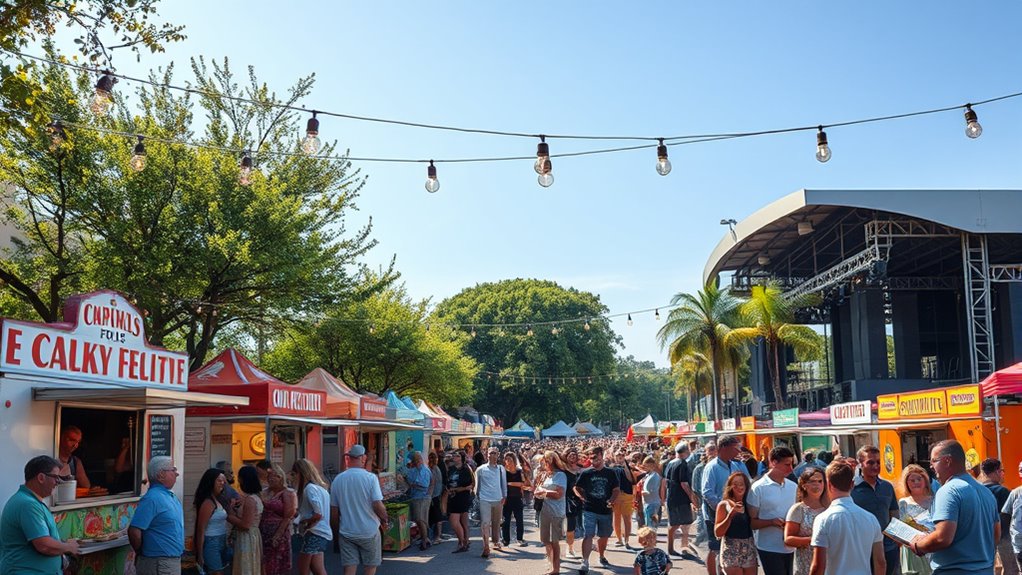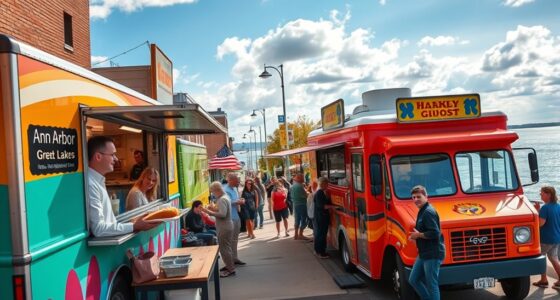To plan a successful food truck festival, start by setting clear goals and a realistic budget to guide vendor choices. Obtain all necessary permits and guarantee vendors meet safety and health standards. Design your site layout to facilitate smooth traffic flow, waste management, and safety measures like fire exits. Coordinate with vendors and staff, develop a marketing plan, and prepare emergency procedures. Focusing on safety, logistics, and promotion all contribute to an enjoyable event—keep going to learn more.
Key Takeaways
- Define event goals, budget, and target audience to guide vendor selection, menu design, and layout planning.
- Obtain all necessary permits, ensure safety compliance, and develop emergency procedures for smooth operations.
- Design a logical site layout with designated parking, waste management, and accessible pathways for safety and flow.
- Coordinate clear communication channels, branding, and safety signage to ensure staff readiness and attendee awareness.
- Implement comprehensive marketing strategies, including social media and influencer partnerships, while prioritizing safety and hazard mitigation.
Establishing Your Event Goals and Budget
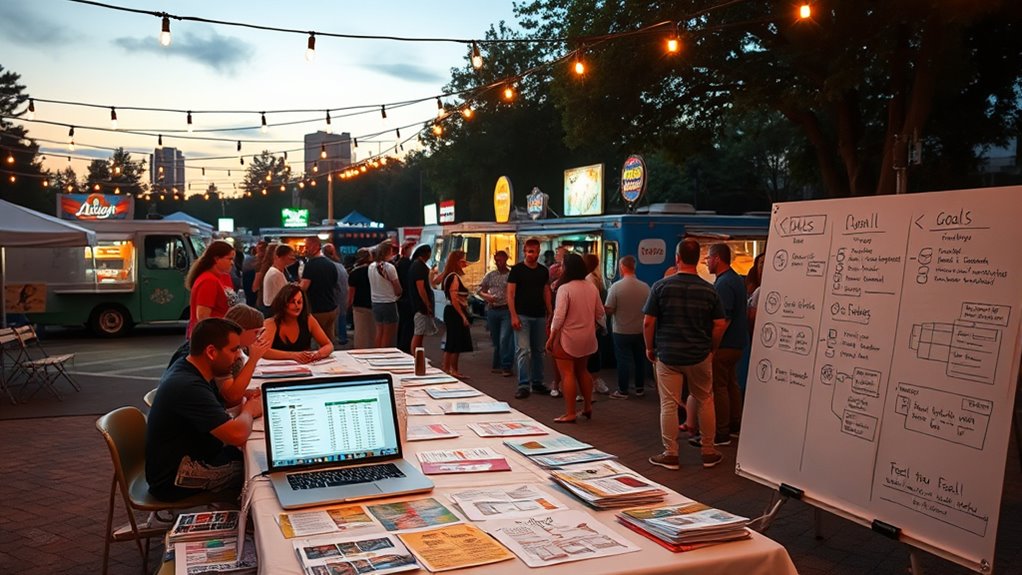
Before planning your food truck festival, you need to clearly define your event goals and establish a realistic budget. Your goals will influence every decision, from choosing the right vendors to designing the menu layout. Focus on creating a cohesive menu design that appeals to your target audience, balancing variety and quality. When selecting vendors, prioritize those who align with your vision and fit within your financial plan. Be transparent about your budget constraints to ensure you don’t overspend on vendor fees or menu development. Setting clear objectives and financial boundaries early on helps you streamline vendor selection, avoid last-minute surprises, and create a successful event that meets both your goals and budget. Additionally, understanding the importance of menu variety can help you cater to diverse tastes while maintaining cost-effectiveness.
Securing Permits and Complying With Regulations
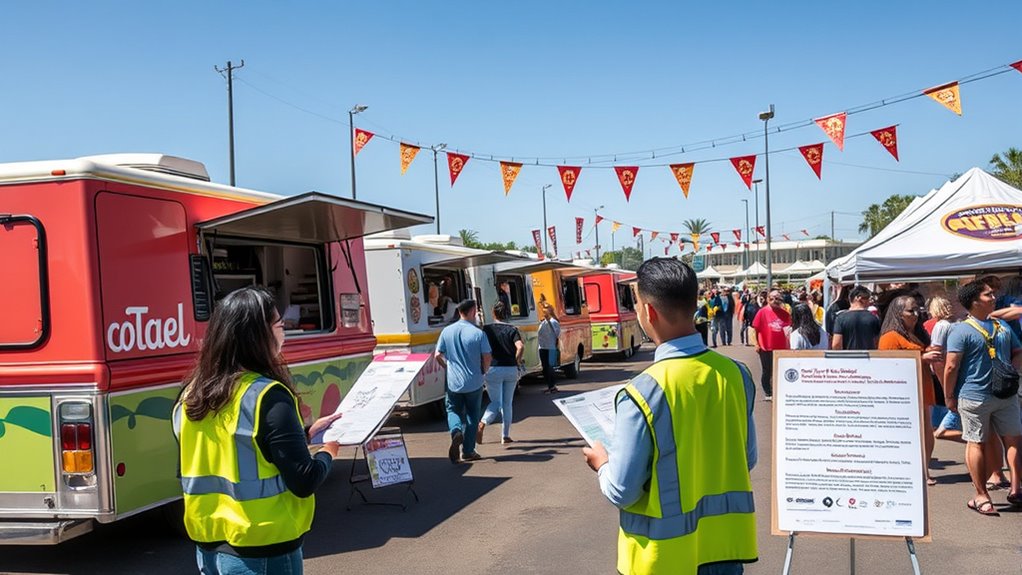
Securing the necessary permits and guaranteeing compliance with local regulations is a critical step in planning your food truck festival. You’ll need to obtain food truck permits from the relevant city or county authorities, which verify that your vendors meet safety and operational standards. Additionally, health regulations must be thoroughly followed to protect attendees and maintain a reputable event. This often involves health department inspections and adherence to sanitation practices. Make sure your vendors have all required documentation before the event. Failing to secure permits or comply with health regulations can lead to fines, delays, or even event shutdowns. Taking the time to navigate the permitting process early ensures a smooth, compliant, and successful festival. Understanding sound recording techniques can also be beneficial for documenting the event for promotional purposes or archival records.
Selecting and Coordinating Food Vendors
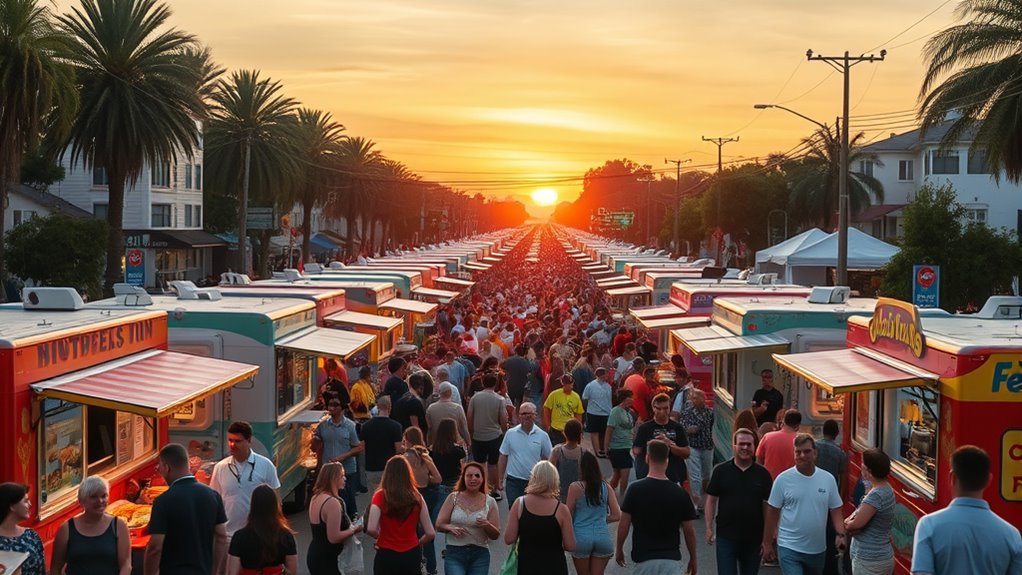
Choosing the right food vendors is essential to creating a diverse and appealing menu that attracts attendees. Focus on vendor diversity to guarantee a variety of cuisines and dietary options, appealing to a broader audience. When selecting vendors, consider their menu compatibility with your event theme and target demographic to maintain a cohesive experience. Reach out early to gauge their interest, availability, and ability to work within your festival’s schedule. Communicate your expectations clearly regarding setup, service times, and health standards. Coordinating with vendors involves confirming their participation, sharing event details, and ensuring they understand the logistical flow. A well-chosen mix of vendors not only enhances attendee satisfaction but also streamlines operations and encourages positive reviews. Understanding food vendor options and their offerings can help optimize your festival’s success.
Planning Logistics and Site Layout
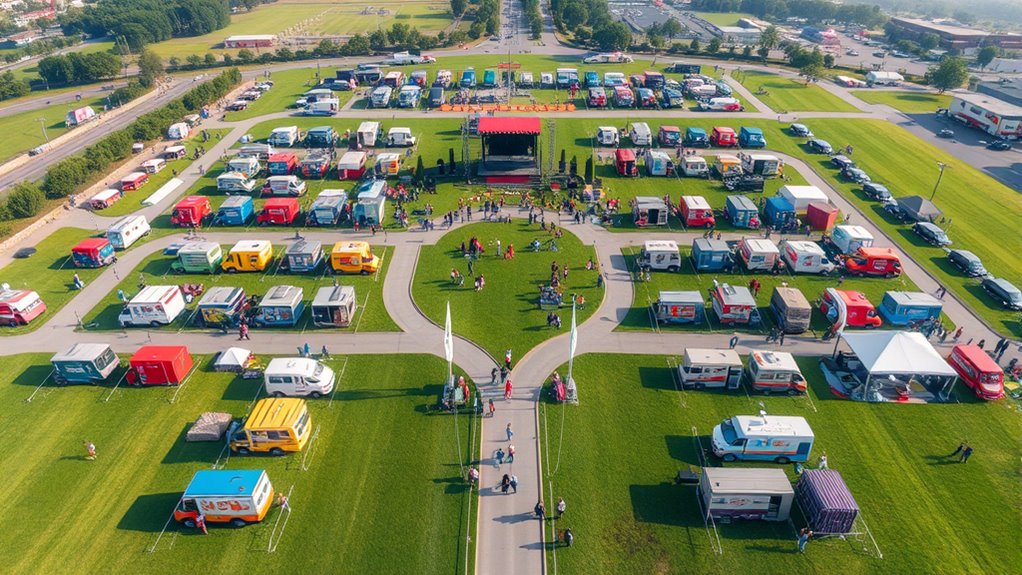
Effective planning of logistics and site layout is essential to ensuring your food truck festival runs smoothly and provides a positive experience for both vendors and attendees. Clear parking arrangements prevent congestion and frustration, so designate specific areas for parking and signs for easy navigation. Efficient waste management is vital—set up enough waste stations and recycling bins to keep the site clean. When planning your layout, consider these key points:
- Position food trucks to allow smooth flow and access.
- Allocate sufficient space for queues and seating.
- Clearly mark pathways, parking, and waste disposal zones.
Developing a Marketing and Promotion Strategy
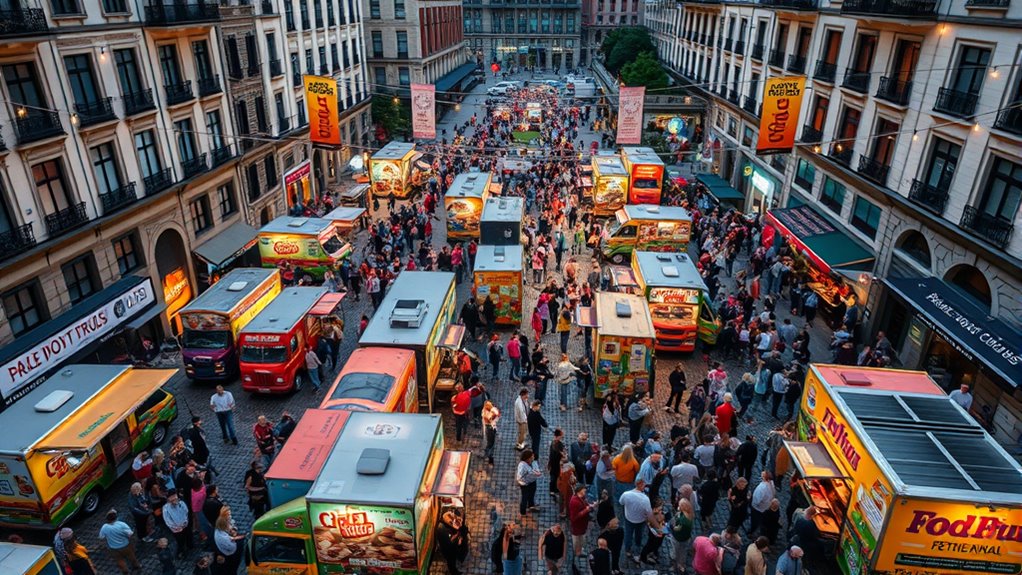
To attract a strong crowd and generate excitement for your food truck festival, developing a targeted marketing and promotion strategy is essential. Start by leveraging social media platforms to reach your ideal audience; create engaging content, share behind-the-scenes looks, and use event hashtags to boost visibility. Partner with local influencers who can promote the event to their followers, expanding your reach organically. Consider running contests or giveaways to encourage sharing and interaction. Make sure your messaging highlights unique food options, entertainment, and vendor details. Coordinate posts leading up to the event to build anticipation. Incorporating effective promotional techniques can further enhance your outreach efforts. By combining social media efforts with influencer partnerships, you’ll maximize exposure, generate buzz, and ensure your festival attracts a lively, engaged crowd.
Managing Staffing and Volunteer Support
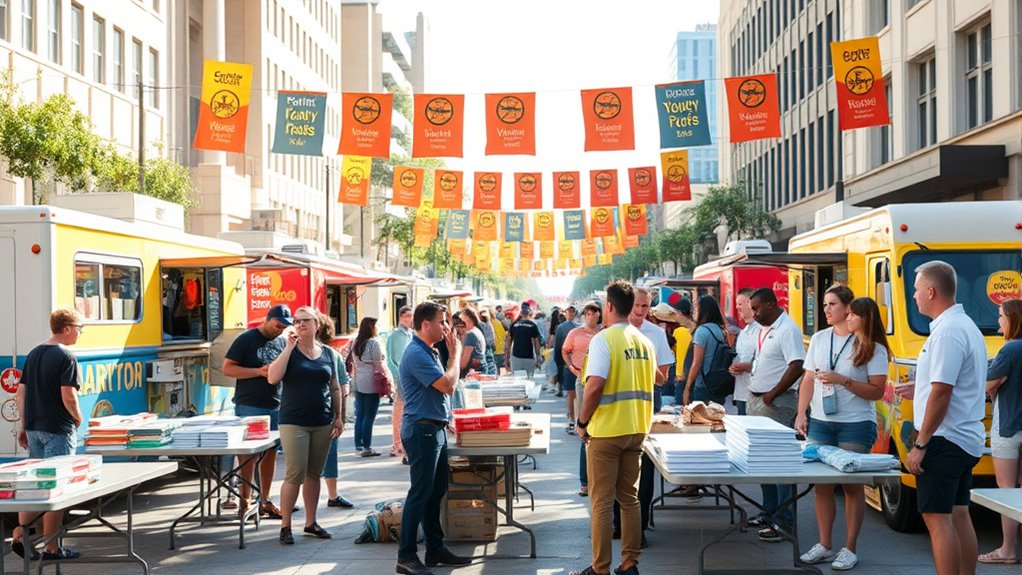
Managing staffing and volunteer support is essential for a smooth festival. You need to recruit dependable volunteers, schedule shifts effectively, and make certain everyone is trained beforehand. When you handle these points well, your event runs seamlessly and leaves a positive impression. Additionally, implementing a clear cookie management policy can enhance the overall event experience for attendees by ensuring website functionality and transparency.
Recruiting Reliable Volunteers
Securing reliable volunteers is essential for the smooth operation of your food truck festival. To attract dependable help, focus on effective recruitment outreach through social media, community boards, and local organizations. Once you’ve found volunteers, show appreciation with volunteer recognition to keep them motivated. Here are key tips:
- Clearly define volunteer roles and expectations upfront.
- Communicate frequently and provide updates to maintain engagement.
- Recognize volunteers publicly during the event to boost morale and encourage repeat support.
- Consider offering volunteer incentives such as small gifts or future event discounts to encourage ongoing participation.
Scheduling Staff Shifts
Have you organized a clear schedule for your food truck festival yet? Effective employee scheduling ensures your event runs smoothly and staff are not overwhelmed. Start by creating a detailed shift rotation plan that covers all hours of operation. Assign staff based on experience and task requirements, balancing workload evenly. Use a scheduling tool or spreadsheet to keep track of who is working when, making adjustments as needed. Clear communication about shift times helps prevent confusion and last-minute cancellations. Planning ahead also allows you to identify gaps in coverage and address them early. Remember, well-organized shift rotation improves staff morale and customer service, creating a better experience for everyone involved. Proper scheduling is essential for a successful, stress-free event. Additionally, considering staffing and volunteer support can help ensure adequate coverage and smooth operations throughout the festival.
Training and Preparation
To guarantee your food truck festival runs smoothly, thorough training and preparation are essential for both staff and volunteers. Proper vendor training ensures everyone understands food truck branding standards, safety protocols, and customer service expectations. Well-trained staff can handle busy periods efficiently, creating a positive experience for attendees. Focus on these key points:
- Conduct comprehensive vendor training sessions covering branding guidelines and event procedures.
- Develop clear communication channels for staff and volunteers to address issues promptly.
- Prepare quick-reference guides to reinforce food truck branding and safety practices.
- Ensuring your team understands proper safety protocols can significantly reduce risks and improve overall event safety.
Ensuring Safety and Emergency Preparedness
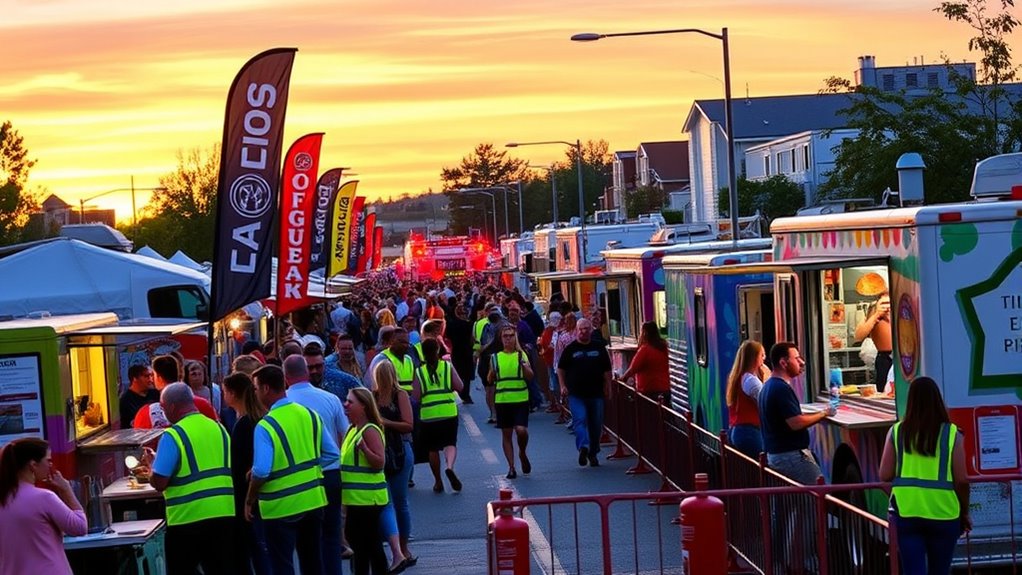
Ensuring safety and emergency preparedness is essential for a successful food truck festival or event. You should have clear fire safety protocols in place, including accessible fire extinguishers and trained staff ready to respond swiftly. Make sure all trucks comply with fire safety regulations and that fire exits are well-marked and unobstructed. Effective emergency communication is critical; set up a system to quickly alert staff and attendees of any issues. Use loudspeakers or visual signals to provide instructions during emergencies. Develop a detailed emergency plan covering scenarios like medical incidents, fires, or severe weather. Regularly review and rehearse these procedures with your team. Auditory processing considerations can also be integrated into your planning to ensure clear communication for all attendees. Being prepared helps protect everyone, minimizes risks, and guarantees a smooth, enjoyable experience for all attendees.
Frequently Asked Questions
How Do I Attract Diverse Food Vendors for My Festival?
To attract diverse food vendors, focus on promoting cultural diversity and building strong vendor networking. Reach out to different communities and cultural groups, inviting vendors that represent various cuisines. Attend vendor networking events and online forums to connect with a broad range of vendors. Offer incentives like flexible payment options or promotional support, making your festival appealing to a wide array of food vendors and ensuring a vibrant, inclusive event.
What Are Cost-Effective Ways to Promote the Event Locally?
Ever wonder how to get the word out without breaking the bank? You can harness social media to target local audiences, creating engaging content and using event hashtags. Partner with community groups and local businesses to boost your reach and build buzz. Does involving the community make your event feel more inviting? These cost-effective strategies make promoting your event impactful and budget-friendly, ensuring you attract a lively crowd.
How Can I Ensure Accessibility for All Attendees?
You can guarantee accessibility for all attendees by prioritizing ADA compliance and providing wheelchair accessibility throughout your event. Make sure pathways are wide and obstacle-free, and include accessible parking and restrooms. Clearly mark accessible routes and entrances, and consider providing assistive listening devices if needed. By actively planning for these features, you create an inclusive environment where everyone can enjoy the event comfortably and safely.
What Environmentally Friendly Practices Can I Implement?
To implement environmentally friendly practices, you can focus on sustainable packaging options, such as biodegradable or reusable containers, to reduce waste. Encourage vendors to participate in composting initiatives by providing clearly marked compost bins for food scraps. Promoting reusable utensils and minimizing single-use plastics also helps. These steps not only cut down on environmental impact but also showcase your commitment to sustainability, resonating positively with eco-conscious attendees.
How Do I Handle Last-Minute Vendor Cancellations?
Imagine your event as a ship sailing smoothly—then a vendor cancels last minute. You handle this by having a vendor backup list ready and clear cancellation policies in place. Reach out quickly to your backup vendors, and communicate openly with attendees about any changes. This proactive approach keeps your event afloat, ensuring that last-minute cancellations don’t sink your plans but instead demonstrate your professionalism and resilience.
Conclusion
As you bring your food truck festival to life, remember that each detail is a brushstroke in your vibrant masterpiece. With careful planning and passion, you create more than just an event—you craft a memorable gathering that becomes a beacon of community and flavor. Let your vision shine brightly, like a guiding star, inspiring others to come together and celebrate the joy of food, fun, and connection.
